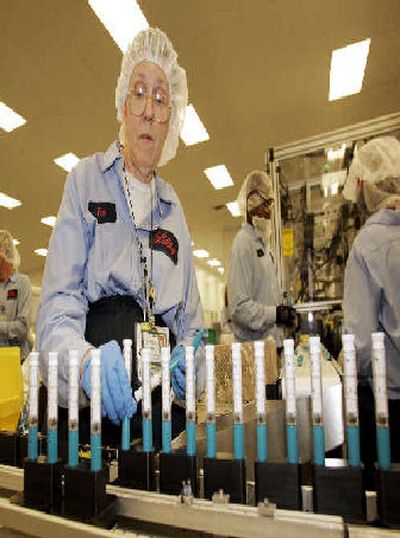Diabetes care is big business

INDIANAPOLIS – A tiny pump injects insulin through a catheter into Bob Russell’s abdomen up to seven times an hour, helping him regulate his blood sugar level so he can stay healthy.
The 53-year-old diabetic from suburban Indianapolis used needles to inject himself with insulin until five years ago, when doctors gave him the pump he calls a “godsend.”
“It’s really simplified my life,” said Russell, who was diagnosed as an insulin-dependent diabetic 23 years ago.
Now, he’s hoping to trade the pump for an inhaler, one of a series of new drugs aimed at a population of diabetics that experts predict could double, to 350 million worldwide, in the next 20 years.
Drug companies are racing to capture that ballooning market as health advocates worry the disease will become a public health threat. Pfizer Inc. plans to debut Exubra, its new inhaled insulin treatment, later this month, and Merck & Co., Novartis AG and Eli Lilly and Co. are awaiting FDA approval for new diabetes products that could generate hundreds of millions of dollars in sales.
“I think it’s intensely competitive,” said John C. Lechleiter, president and chief operating officer of Indianapolis-based Lilly, which began offering Byetta, an injectable diabetes treatment, last year. “Many companies that would not have said they were engaged in diabetes research 10 years ago are squarely there now,” he said.
Albert Rauch, a health care analyst with A.G. Edwards & Sons, said he expects the $10 billion diabetes market to eventually rival the $20 billion cholesterol market.
“We think they could be the next blockbuster class of drugs for the pharmaceutical industry,” he said.
But the companies could have trouble getting their newest medications into patients’ hands.
Gun-shy physicians – many of whom are still reeling over fallout from Vioxx, a blockbuster arthritis drug that was pulled from the market after it was linked to increased risk of heart problems – want more research about potential long-term health problems. And insurers could be slow to add some of the latest diabetes drugs to their preferred drug lists.
“It’s safe to assume that unless Exubra is priced comparatively to insulin, it would not be added,” said David Beshara, chief pharmacy officer for Tennessee’s Medicaid program.
Robert Seidman, vice president and chief pharmacy officer for the Indianapolis-based WellPoint Inc., the nation’s largest insurer, said a medication usually is on the market six months before a panel of company experts reviews it to decide whether to add it to its preferred drug list.
Health advocates say the need for new treatments is clear.
A study released this month by the American Diabetes Association said one in three Americans has diabetes or a precursor to the disease, which causes elevated blood sugar levels. Untreated, diabetes can be fatal or cause blindness and circulation problems.
More than 90 percent of patients are diagnosed with Type 2 diabetes, a condition linked to obesity that occurs when the body cannot effectively use the insulin it produces.
The disease could yield billions of dollars for pharmaceutical companies.
“Whenever there’s a great commercial opportunity, companies devote more resources,” said Barbara Ryan, an analyst at Deutsche Bank.”
Some examples include:
•Whitehouse, N.J.-based Merck is awaiting FDA approval for Januvia, a new class of oral diabetes drug that enhances the body’s ability to lower elevated blood sugar levels. Later this year, Merck also expects to file an application for MK-431A, an unnamed drug that combines Januvia with the common diabetes medication metformin. The combination would allow patients to take fewer pills each day. Analysts predict Januvia sales could reach $1 billion in 2009.
•Prospects could be even bigger for Galvus, a similar medication being developed by Swiss drug maker Novartis.
•New York-based Pfizer is in the midst of a campaign for Exubra targeted at more than 200,000 health professionals – including doctors, pharmacists and diabetes educators – before its mid-July launch. Company officials have not announced a date for the drug’s U.S. release but have already begun sales in Germany and Ireland. Analysts said they expect Exubra sales to climb to $1.5 billion by 2010.
•Lilly, which introduced the first commercially available insulin in 1923, also is honing its focus on the disease. Lilly’s diabetes portfolio already accounts for one-fifth of the company’s revenue, a figure analysts predicted could more than double in the next four years. Lilly expects to complete late-stage clinical trials of its own version later this decade.